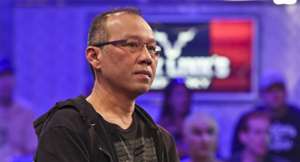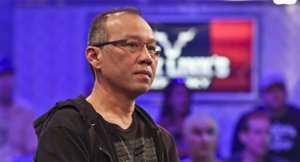Questions Remain Regarding Paul Phua Sportsbetting Arrest
The circumstances surrounding the arrests of ultra-high-stakes Malaysian gambler Wei Seng “Paul” Phua and seven of his associates in Las Vegas a week ago continue producing attention and curiosity across the gambling world.
Phua and the others, which included his son Darren (Wai Kit) Phua, were accused of operating an international sportsbetting site from three private villas on the Caesars Palace property, where they allegedly demanded extensive computer equipment and high-speed internet connectivity while remotely operating a Philippines-hosted sports betting website, booking hundreds of millions of dollars of action on the recently completed FIFA World Cup.
Phua is known in high-stakes poker circles for his prominence in high-stakes cash games in Macau which have included several of the world’s most famous pros, including Tom Dwan, Andrew Robl and Phil Ivey. Phua also participated in the 2012 Big One for One Drop charity event run in conjunction with that year’s WSOP, and may have been one of two “Asian businessmen” — as a WSOP presser once stated — who were originally slated to participate in the 2014 version of the same event, but who were instead among several players who cancelled their participation under circumstances never fully explained.
FlushDraw was one of the leading poker outlets with the original news on Phua’s arrest. Since then, additional details have surfaced, many of them contained within the criminal complaint itself, which FlushDraw has obtained. Numerous rumors have clouded the story, even as the arrests themselves paint a picture of a larger chain of events and circumstances than originally indicated.
 According to the criminal complaint, Phua and his associates rented three private villas at Caesars during the second week of June, first occupying them over a span of several days. Each of the villas was rented for an indeterminate period. The villas are typical of high-end perks available to the world’s wealthiest gamblers, the “whales” of the industry.
According to the criminal complaint, Phua and his associates rented three private villas at Caesars during the second week of June, first occupying them over a span of several days. Each of the villas was rented for an indeterminate period. The villas are typical of high-end perks available to the world’s wealthiest gamblers, the “whales” of the industry.
Phua himself occupied one of the three villas, as he traveled to and fro. On June 17th, he flew to Macau on his private jet, and was arrested along with 21 others — described as his associates — within one hour of his entering one of Macau’s giant casinos. The 22 were charged with running an illegal gambling ring, described in reports as an illegal sportsbetting syndicate.
Phua himself was released two days later, whereupon he immediately returned to Las Vegas. A USAO press release about his second arrest, that being the Caesars Palace-related one, mentioned the earlier incident in Macao and claimed the case was ongoing, while a separate report from the Malaysian Times (Phua’s home country) stated that Macau authorities had deported Phua, while not detailing the fate of the 21 others.
The massive demands for high-end computer equipment and DSL internet hookups at Caesars Palace, according to the US criminal complaint, occurred around June 22nd. This was nearly two weeks after Phua’s associates first began occupying the three villas, but was immediately after Phua himself returned to the US following the Macau incident.
All told, Caesars helped Phua and his associates outfit the three villas with a total of 15 workstation computers, each with three monitors attached, and with the high-end DSL connectivity arranged to go directly to the villas. While casinos customarily service the every whim of their “whales,” there seems little doubt that the casino’s interest was piqued, particular since the news of Phua’s Macau arrest was also spreading.
What happened next is one of the most interesting parts of the story. Phua’s group occasionally placed calls for emergency technical service, but otherwise denied Caesars staff ordinary access to the villas. It was on one of the emergency support visits, however, that a Caesars technician first espied the possible gambling operation being conducted on the premises, and according to the complaint, surreptitiously snapped a few photos on his cell phone.
At what point Caesars contacted the FBI remains unclear, but it appears to have been sometime after June 22nd, by which time Phua may already have been being actively tracked by US authorities.
Phua’s group also requested a brand new laptop from Caesars — the type of thing that “whales” receiving all-encompassing concierge services can do — and Caesars complied with that request as well, even as their interest and concern grew. Then, however, in a strange Caesars-vs-Caesars moment, the technician who delivered the laptop to Phua’s villa was forbidden to enter the main part of the villa to help connect it to the impromptu network being forced to do so from the nearby butler’s pantry.
That butler figures into the allegations as well, because he was a Caesars employee, provided to Phua and his associates. The butler isn’t named, but is described as Chinese-speaking. What’s interesting is that he blocked two other people from full access to the villa when they delivered the new laptop on July 4th — both of those were presented as service technicians, but one of them was actually an FBI agent who was gathering information on what was increasingly suspected to be an active “wire room” operation.
The butler, according to the complaint, sided with Phua and the other guests to the point of being physically threatening to the service workers. (Whales or not, one would have to think this particular butler might be looking for new employment in the wake of the arrests.) The real service technician of the two who visited that day refused further trips to the villas, citing concerns for his/her personal safety. The FBI agent, again posing as a security worker, answered another call the following day, and was able to confirm directly that several computers in the villas appeared to be in active use as part of an online sportsbetting operation.
That led to the obtaining of warrants and the raids and arrests, which took place on July 9th. Phua and the seven others were each charged with two counts — transmission of wagering information and operating an illegal gambling business. A third allegation of “aiding and abetting” was listed in the official complaint but not specifically detailed. It is uncertain whether the USAO plans to file additional charges, though that possibility remains as the computers and other records continue to be examined.
Conjecture that the FBI might have planted spyware of some form on the laptop delivered on July 4th seems unfounded, since roughly the same information could have been obtained via a wiretap on the DSL service once a search warrant had been obtained. Similarly, it seems that the FBI and Nevada USAO did not get involved until requested to do so by Caesars, even if they may have been tracking Phua’s movements. The first press release issued by the USAO in the wake of the arrests asserts that Phua is a high-ranking member of a prominent Asian organized-crime syndicate, the 14K Triad, which is alleged to specialize in illegal sports wagering. Evidence of that was not, however, included in the Caesars Palace-related complaint.
Phua was identified during questioning of his sin, Darren, as being one of owners (or perhaps the primary owner) of IBCBET, which may rank as high as #3 in overall volume among Asian sportsbetting platforms. What’s interesting about the story is that Phua’s group appears to have spent considerable time monitoring the betting lines at rival Asian-market site SBOBET, perhaps laying off some action there as well. SBOBET quickly issued a statement in the wake of the Phua arrests, disclaiming any known connection to Phua’s group.
Another element overlooked in early reports is that the criminal complaint took pains to show that at least some small amount of illicit betting action was taken from a gambler right there in the Las Vegas area, making the entire operation expressly illegal under US and Nevada law. The complaint includes exchanges between Darren Phua, Paul’s son, and an unnamed North Las Vegas gambler who is identified by cell phone number, joining together to make bets on WC games, with the action placed on Phua’s own IBCBET site.
Whether additional instances of sports wagering involving US-based punters surfaces remains to be seen. It is likely, however, that the overall amount of US-based action was very tiny compared to the massive amounts that Phua’s group was allegedly processing overall — roughly 2.7 billion Hong Kong dollars over the span of the FIFA World Cup, or about USD $360 million.
All of that action, according to the complaint, was being funneled through offshore services being remotely controlled by Phua and his associates via the network of workstations quickly set up at Caesars Palace, via remote-proxy software programs including TeamViewer and others.
Phua and his son were quickly released on $2.5 million bail, with his $48 million GulfStream jet also held as collateral. Others of the case’s defendants remain in custody, with prosecutors alleging severe flight risks. Paul Phua himself has retained Las Vegas super-lawyer David Chesnoff in his defense, who immediately proclaimed Phua’s innocence. Among the latest twists, courtesy of Chesnoff, were a promissory note by high-stakes pro Andrew Robl for $1.5 million toward Phua’s bail.
Even as the legal proceedings continue, rumors swirl regarding the greater circumstances surrounding the sportsbetting bust. Vague rumors published on poker and sportsbetting forums assert that the mess goes far deeper than even the crazy tale relayed in the official complaint.
Whether or not the strained industry relationships between Caesars Palace parent Caesars Entertainment and rival giants Las Vegas Sands and Wynn Gaming (whose bosses, Sheldon Adelson and Steve Wynn, control most of the Macau casino action) also play a hidden role remains to be seen as well.




















COMMENTS